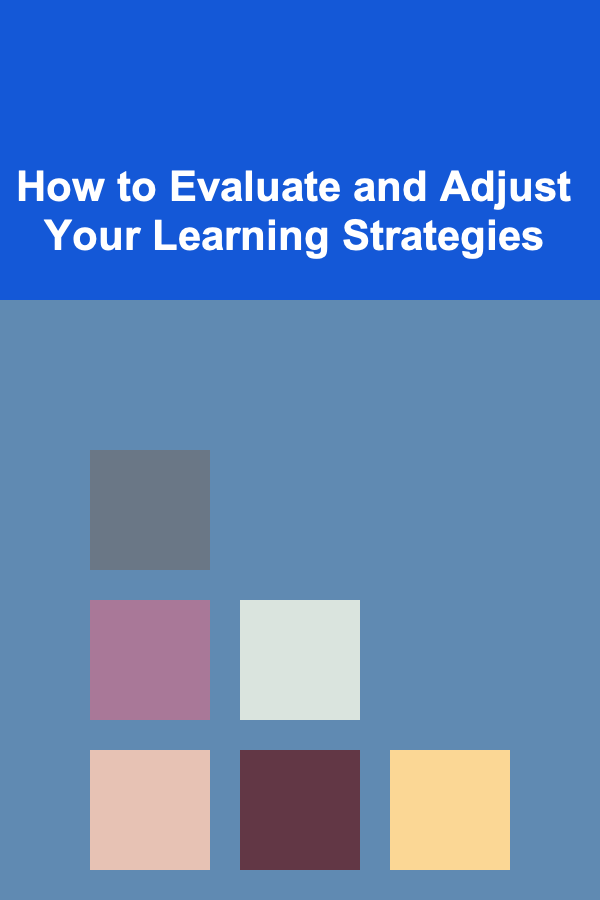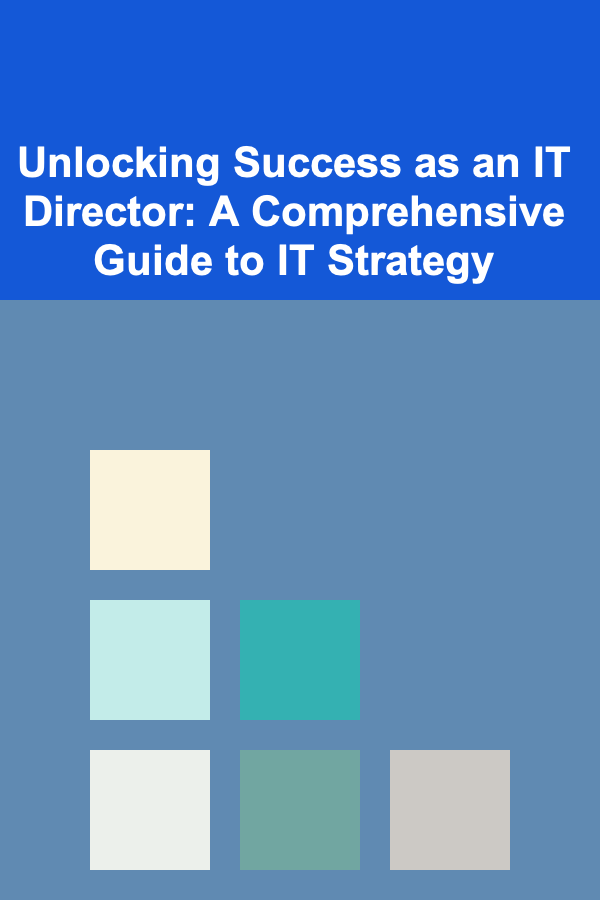
How to Evaluate and Adjust Your Learning Strategies
ebook include PDF & Audio bundle (Micro Guide)
$12.99$8.99
Limited Time Offer! Order within the next:

In an age marked by rapid technological advancement and constant change, the ability to learn effectively has become more critical than ever. Whether in academic settings, professional environments, or personal development, mastering how to evaluate and adjust your learning strategies can significantly impact your success. This article aims to provide a comprehensive guide on effectively assessing your learning methods and making necessary adjustments to optimize your learning experience.
Understanding Learning Strategies
2.1. Definition of Learning Strategies
Learning strategies refer to the approaches and techniques that individuals use to acquire, retain, and apply knowledge. These strategies can be cognitive, metacognitive, or resource-based, and they play a crucial role in facilitating effective learning experiences. Understanding these strategies is the first step toward evaluating and adjusting them effectively.
2.2. Types of Learning Strategies
There are several types of learning strategies:
- Cognitive Strategies: Techniques that involve mental processes, such as summarization, elaboration, and self-explanation.
- Metacognitive Strategies: Involves planning, monitoring, and evaluating one's own learning process.
- Resource-Based Strategies: Utilizing external resources, such as textbooks, online courses, and study groups.
Recognizing which strategies align with your learning style is essential for effective evaluation.
The Importance of Evaluating Learning Strategies
Evaluating your learning strategies is vital for several reasons:
- Self-Awareness: Understanding what works and what doesn't helps you become a more effective learner.
- Adaptability: In a rapidly changing world, being able to adjust your learning strategies ensures that you remain relevant and knowledgeable.
- Enhanced Performance: Regular evaluation leads to improved retention and application of knowledge, resulting in better academic or professional performance.
By regularly assessing your learning strategies, you can identify areas for improvement and make informed decisions about how to enhance your learning processes.
Methods for Evaluating Learning Strategies
Evaluating your learning strategies requires a systematic approach. Here are some effective methods to consider:
4.1. Self-Assessment
Self-assessment is a powerful tool for evaluating your learning strategies. It involves reflecting on your learning experiences, identifying strengths and weaknesses, and considering how your strategies align with your goals.
Questions to Consider:
- What strategies do I currently use to learn new material?
- How effective do I feel these strategies are?
- What challenges do I face in my learning process?
4.2. Feedback from Peers and Educators
Seeking feedback from peers and educators can provide valuable insights into your learning strategies. Others may notice patterns or areas for improvement that you might overlook.
Methods for Gathering Feedback:
- Form study groups to discuss strategies and share insights.
- Request informal feedback from instructors on your learning approaches.
- Participate in peer evaluations where you assess each other's strategies.
4.3. Performance Metrics
Analyzing performance metrics can help evaluate the effectiveness of your learning strategies. This includes tracking grades, test scores, and completion rates of assignments.
Data to Collect:
- Grades on assessments before and after implementing new strategies.
- Time spent studying versus the amount of material learned.
- Retention of information over time (e.g., through quizzes or self-testing).
By combining qualitative self-assessment with quantitative performance metrics, you can gain a comprehensive understanding of your learning strategies.
Adjusting Your Learning Strategies
Once you've evaluated your current strategies, the next step is to make adjustments to improve your learning outcomes. Here's how to do it effectively:
5.1. Identifying Areas for Improvement
After evaluating your strategies, pinpoint specific areas that require adjustment. These may include:
- Ineffective study techniques
- Lack of engagement with the material
- Poor time management
Being precise about what needs improvement will guide your adjustments more effectively.
5.2. Researching New Strategies
Staying informed about various learning strategies can open doors to new and potentially more effective methods. Resources include:
- Academic literature on learning and cognition
- Online courses focused on study skills and learning strategies
- Workshops and seminars led by educational professionals
Exploring new strategies can provide fresh perspectives and techniques that resonate with your learning style.
5.3. Implementing Changes
When you're ready to adjust your strategies, start small. Implement one or two new techniques at a time to gauge their effectiveness. This gradual approach allows you to monitor changes without overwhelming yourself.
Example of Implementation:
- If you decide to incorporate active recall as a new strategy, practice it by using flashcards or self-quizzing on material regularly.
- Set specific goals for each study session to focus on particular strategies.
Continuously monitor the effectiveness of these new strategies and be prepared to make further adjustments as needed.
Continuous Improvement: A Lifelong Learning Approach
Learning is not a one-time event but a lifelong process. Adopting a mindset of continuous improvement encourages you to regularly evaluate and adjust your strategies as you grow and evolve.
Key Principles of Lifelong Learning
- Curiosity: Maintain an innate desire to learn and explore new topics.
- Flexibility: Be willing to adapt your strategies as circumstances change or as you encounter new information.
- Reflection: Regularly take time to reflect on your learning experiences and outcomes.
By integrating these principles into your approach, you can cultivate a proactive attitude toward learning that serves you throughout your life.
Case Studies: Successful Strategy Adjustments
To understand the practical application of evaluating and adjusting learning strategies, let's explore a few case studies:
Case Study 1: The High School Student
Background: A high school student struggled with math, often relying on rote memorization.
Evaluation: Through self-assessment and feedback from a tutor, the student realized that they understood concepts better when visual aids were used.
Adjustment: The student began incorporating visual learning strategies, such as drawing diagrams and using online interactive simulations.
Outcome: Over time, the student saw a significant improvement in their grades and confidence in math.
Case Study 2: The Graduate Student
Background: A graduate student was overwhelmed by the volume of reading required for their thesis.
Evaluation: After analyzing their time management, the student found that they spent too much time passively reading without retention.
Adjustment: They decided to implement active reading strategies, such as summarizing each chapter and discussing key points with peers.
Outcome: The student became more engaged with the material, leading to better retention and a stronger thesis argument.
These case studies illustrate the value of evaluating and adjusting learning strategies based on personal experiences, feedback, and performance metrics.
Conclusion
Evaluating and adjusting your learning strategies is essential for achieving academic and professional success. By understanding different types of learning strategies, employing various evaluation methods, and making informed adjustments, you can enhance your learning experience significantly.
This process fosters self-awareness, adaptability, and continuous improvement, empowering you to navigate the complexities of learning in a dynamic world. Remember, effective learning is a journey rather than a destination; embrace it with curiosity and a willingness to grow. As you refine your strategies, you will find yourself not only mastering new knowledge but also developing skills that will serve you throughout your life.

How to Designate Zones in Your Office for Different Tasks
Read More
How to Implement a Daily Cleaning Routine for Your Office
Read More
How to Use Financial Apps to Manage Your Money More Effectively
Read More
How to Use Labels to Keep Your Pantry Tidy
Read More
The Art of Software Architecture: Crafting High-Performance Systems
Read More
Unlocking Success as an IT Director: A Comprehensive Guide to IT Strategy
Read MoreOther Products

How to Designate Zones in Your Office for Different Tasks
Read More
How to Implement a Daily Cleaning Routine for Your Office
Read More
How to Use Financial Apps to Manage Your Money More Effectively
Read More
How to Use Labels to Keep Your Pantry Tidy
Read More
The Art of Software Architecture: Crafting High-Performance Systems
Read More